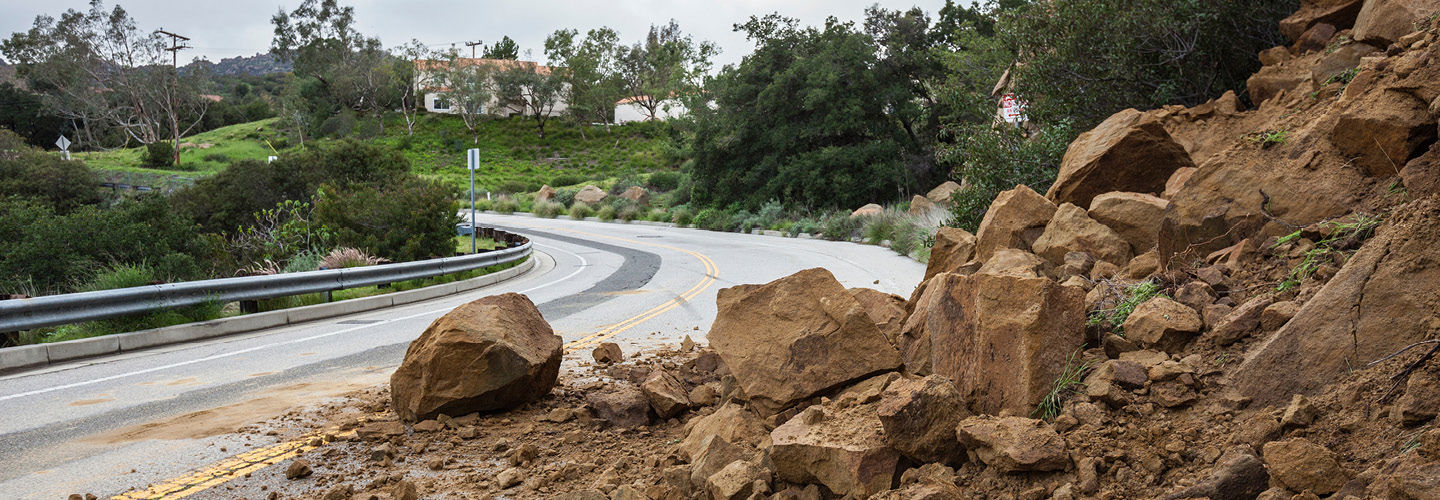Coastal hazards (Coastal inundation, marine waves)
Coastal inundation is caused by severe weather events such as storms where low-pressure weather systems, large waves and strong winds combine to raise water levels.
Coastal inundation and land instability impacts:
- Erosion of dune systems
- Biodiversity loss
- Building damage/collapse
- Damage to roads (washouts)
- Damage to man-made coastal defences and structures.
Fire
Wildfires can happen at any time of the year. The risk will vary depending on the weather, for example fire risk will be higher in times of low rainfall and drought.
- If you see smoke or a fire, call 111 immediately and ask for ‘Fire.
- Be ready to evacuate if you have to and don’t return until you have been told by an official source such as emergency management or emergency services.
- Take personal belonging, important documents and pets with you if there is time to collect this safely before you leave.
Slope instability (Landslides)
Slope instability can be caused by heavy rain, earthquakes, vegetation removal, leaking pipes and earthquakes. Slope instability can cause landslides to occur when the strength of the slope is overwhelmed. Landslides can damage land, property and infrastructure such as roads, railways and communication systems.
Areas most at risk of slope instability in Taranaki are the Eastern Hill Country.
If you know you are in a landslide hazard area:
Keep an eye out for the warning signs on your property. Contact your local city or district council, or engage a geotechnical engineer if you notice:
- small slips, rock falls and subsidence at the bottom of slopes.
- sticking doors and window frames, or gaps where frames are not fitting properly.
- Steps, decks, and verandas moving or tilting away from the rest of the house.
- new cracks or bulges on the ground, road, footpath, retaining walls and other hard surfaces
- tilting trees, retaining walls or fences.
What to do if a landslide if a landslide is happening:
- If a landslide is happening, or you think a landslide is going to happen, get out of the way quickly.
- Evacuate if your home or the building you are in is in danger — take your Grab Bag and pets with you if you can do so quickly.
- Warn neighbours and help others if you have time.
- Look to connect with emergency services or your local council for updates and information.
Biosecurity Threat (animal epidemic, plant and animal pests)
Maintaining an effective biosecurity programme is of critical importance to the quality of life and environmental and economic wellbeing in New Zealand.
Animal epidemics (including those that affect poultry) are a significant threat to the region. Given the importance of the agricultural sector, any outbreak would have a particular, and long lasting, effect on the regional economy.
Animal diseases such as Foot and Mouth Disease, avian influenza, or Bovine Tuberculosis cam reduce livestock productivity and/or cause a collapse of export trade. These diseases are highly contagious and may spread rapidly.
The Ministry for Primary Industries (MPI) is the lead agency for response to such incursions.
Taranaki Emergency Management will support and assist MPI and provide for emergency welfare for people if requested.
Hazardous substance
Many kinds of hazardous substances are transported, stored and used in Taranaki.
Hazardous substances can be:
- Explosive
- Flammable
- Able to oxidise
- Corrosive
- Toxic
- Ecotoxicity, with or without bioaccumulation (i.e can kill living things either directly or by building up in the environment).
- Can generate a hazardous substance on contact with air or water.
If a hazardous substance emergency occurs:
- If you are concerned someone has been exposed to a poison, contact the National Poisons Centre on 0800 764 766.
- Seek advice as spills and leaks of hazardous substances may require emergency actions to be taken.
- Fires can result from a hazardous substance emergency; the New Zealand Fire Service often takes a lead role in the response to hazardous substance emergencies.
- The action required in an emergency differs depending on the substance involved but may include evacuation or staying inside with doors and windows closed.
- Listen to your local radio station if you suspect that a hazardous substance emergency may be happening near you.
Transport Incident
Taranaki can become isolated easily with three main state highways in and out of the region.
Accidents are usually responded to and dealt with by the emergency services. Disruptions can be caused by road closures particularly if the accident is on a main transport route.
Current information on State Highways is available from Waka Kotahi through there Facebook or website highway conditions.

